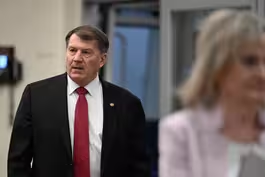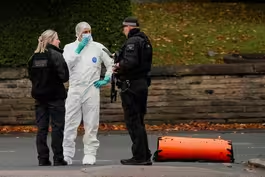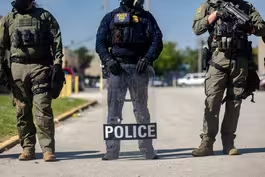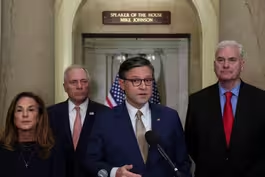
New book explores Israeli-Palestinian peace efforts
Clip: 10/2/2025 | 7m 14sVideo has Closed Captions
'Tomorrow is Yesterday' explores why Israeli-Palestinian peace efforts have fallen short
For decades, the U.S. has tried to resolve the Israeli-Palestinian conflict. Those efforts, despite the deep passion among the mediators and the endless work with both sides, ultimately failed. Robert Malley participated in peace talks at Camp David 25 years ago and co-authored a book about the pursuit of peace. He sat down with Nick Schifrin to discuss "Tomorrow is Yesterday."
Problems playing video? | Closed Captioning Feedback
Problems playing video? | Closed Captioning Feedback
Major corporate funding for the PBS News Hour is provided by BDO, BNSF, Consumer Cellular, American Cruise Lines, and Raymond James. Funding for the PBS NewsHour Weekend is provided by...

New book explores Israeli-Palestinian peace efforts
Clip: 10/2/2025 | 7m 14sVideo has Closed Captions
For decades, the U.S. has tried to resolve the Israeli-Palestinian conflict. Those efforts, despite the deep passion among the mediators and the endless work with both sides, ultimately failed. Robert Malley participated in peace talks at Camp David 25 years ago and co-authored a book about the pursuit of peace. He sat down with Nick Schifrin to discuss "Tomorrow is Yesterday."
Problems playing video? | Closed Captioning Feedback
How to Watch PBS News Hour
PBS News Hour is available to stream on pbs.org and the free PBS App, available on iPhone, Apple TV, Android TV, Android smartphones, Amazon Fire TV, Amazon Fire Tablet, Roku, Samsung Smart TV, and Vizio.
Providing Support for PBS.org
Learn Moreabout PBS online sponsorshipAMNA NAWAZ: Leaders from Egypt, Qatar and Turkey are all trying to convince Hamas to accept President Trump's peace plan to end the war in Gaza.
That's a plan Israel has already agreed to.
Hamas is still weighing the deal, but reportedly considers some parts of it unacceptable.
It's a crucial moment, and it's a continuation of past American efforts to end the Israeli-Palestinian conflict.
Nick Schifrin has more on the historical context.
NICK SCHIFRIN: For decades, the U.S.
has tried to resolve the Israeli-Palestinian conflict.
Those efforts, despite deep passion among the mediators and endless work with both sides, failed.
Why?
And is there a direct line from the success of the Oslo Accords in 1993 to the horrific violence of the October 7 terrorist attacks and subsequent Israeli war in Gaza?
Those are the questions being asked by Robert Malley, who 25 years ago participated in peace talks at Camp David.
He later worked with the Obama administration on Mideast peace, as well as negotiating with Iran, a role he resumed during the beginning of the Biden administration.
And now Malley has written a new book co-authored with longtime Palestinian negotiator Hussein Agha called "Tomorrow Is Yesterday: Life, Death, and the Pursuit of Peace in Israel/Palestine."
Rob Malley, thanks very much.
Welcome back to the "News Hour."
The title is "Tomorrow Is Yesterday."
And you write this in the prologue: "Israelis and Palestinians are back where they were decades ago."
But from the outside, things look, in many ways, worse than ever.
So why that title?
ROBERT MALLEY, Co-Author, "Tomorrow Is Yesterday: Life, Death, and the Pursuit of Peace in Israel/Palestine": That's a good way to start.
Let's look at where we are today, which is what propelled us to write this book, Palestinians being forced to flee and then flee from the area that they just fled, and then being bombed in the place that they were told to take refuge from the first bomb, being deprived of food, of water, everything, Israelis on October 7 being the victim of a massacre, Palestinians resorting to individual acts of violence, doing what they can, because vengeance is their only horizon.
So, we are where we were in the past, and the real question is, how come, after -- from '92 to now, look at where we are, and the explanation, to really sum it up in one word, is that this American-led peace process was meaningless.
It was fleeting.
It didn't have any real roots on the ground with Israelis and Palestinians.
It ended up being a lot of hot air.
NICK SCHIFRIN: So let's go back to where we define the modern peace process, 1993, the Oslo Accords.
And you write this -- quote -- "Israeli and Palestinian leaders for a while invested in diplomacy, but each diplomatic venture ended in failure.
In the end, what mattered was the balance of power and brute force.
Those who mattered most knew it best."
How so?
ROBERT MALLEY: Let's look again at what happened in Oslo.
Each side thought they were getting something that, in fact, they really didn't achieve.
The Palestinians thought, we have made this big concession by accepting the fact there would be an Israeli state, a state of Israel on the borders of 1967, and they thought that, in exchange, they were going to get sovereignty, they were going to get justice, they were going to get their state.
The Israelis thought, we're going to recognize the Palestinian Liberation Organization as a representative of the Palestinian people, and we're going to give them some ability to govern themselves.
And in exchange, we're going to get full security.
Neither side was prepared to do what the other side expected of them.
There was never any congruence between what the Israelis wanted and what the Palestinians wanted.
So what were the foundations of this peace process?
Not much.
And it turns out the Israelis quickly realized what's going to matter or facts on the ground, settlement construction, making sure that they could repress any signs of Palestinian activism.
And on the Palestinian side, they never really gave up violence, because that was the one language that they felt the Israelis would understand.
NICK SCHIFRIN: And in the middle of that were the Americans.
And this is what you write about American participation in this process: "The American objective was to get Israelis and Palestinians to speak the right words, sign the right piece of paper, overcome textual gaps.
The Israeli and Palestinian objectives were to get the Americans off their backs."
ROBERT MALLEY: We were so focused on, can we get them to agree on what it would mean if they -- if there was a Palestinian state, just words on a piece of paper, without coming to terms with the nature of this conflict, the nature of this beast, which was a historical clash of narratives.
From the Israeli perspective, they won in 1948.
They won in 1967.
And each time, they keep winning and the Palestinians keep asking for more.
And the Palestinians believe that they were victims of a historic injustice in 1948, 700,000 Palestinians expelled, loss of their land.
And so for us Americans to come in and say, well, let's just paper over these differences, forget about the right of return, forget about Israeli historic grievances and Palestinian historic grievances, put a bow around it and call this peace, that was never going to fly with the parties.
You can't but conclude the fact from what's happened between the 1990s to today there has to be a connection between what happened then and what happened on October 7 and afterward.
It's not like these are two completely disconnected events.
NICK SCHIFRIN: What do you see that connection as?
ROBERT MALLEY: The connection is, again, the failures of these efforts to reach this two-state solution.
On the ground, everything was moving in the direction that was inconsistent with the two-state solution.
And Americans and Europeans and others were repeating the mantra, we're moving toward a two-state solution, an irreversible path to two-state solution.
NICK SCHIFRIN: And yet you and Hussein do write this: "There were moments when a different outcome might have been possible, but history would have needed a mediator with vision, nuanced understanding of the politics and psychology of the two sides, and a willingness to exert power equally on and against both."
ROBERT MALLEY: Sure.
I think there was a naivete in thinking at times that we were close to a deal, when nothing had been achieved, and I think just strategic misunderstanding of the conflict.
The origins of this idea of a two-state solution, they didn't start with Israelis or Palestinians.
They started from the outside.
This notion of partition was alien, and Israelis and Palestinians never were enthusiastic about it.
It was never their natural landing place.
And, today, with everything having moved in the opposite direction, with each side convinced that the other side wants its destruction, its eradication, how could there be support for a two-state solution other than in the hallways of diplomatic corridors?
NICK SCHIFRIN: In the end, you write this: "This emotional and existential clash will be truly settled not through adroit verbal gymnastics, but through a more painful and honest reckoning."
What is that reckoning?
ROBERT MALLEY: It's a reckoning with the fact that both sides have this historic -- these yearnings, this historic attachment to the land.
Israeli Jews feel very differently about -- many of them, about what the land means to them.
Palestinians have this whole conception of history and, again, the right of return for refugees.
So let's not aim for the sky and say we need immediate peace.
At a minimum, they need to coexist, coexist as equals on the land that they both share.
NICK SCHIFRIN: Let's talk about Iran briefly.
During the Biden administration, you were the special envoy for negotiating with Iran, but you were suspended for that job.
Can you tell us why?
ROBERT MALLEY: I was told that it had to -- the investigation had to do with an alleged mishandling of classified information.
I was not told then what they were looking at.
I don't -- still don't know what they were looking at, and I may well go to my grave without knowing what they were looking at.
What I do know is that, after two years of investigation, the Department of Justice told my lawyers that the investigation had -- has been closed.
So it's a bit odd.
It's a bit Kafkaesque, but it is what it is.
NICK SCHIFRIN: Rob Malley, the book is "Tomorrow Is Yesterday: Life, Death, and the Pursuit of Peace in Israel/Palestine."
Thanks very much.
ROBERT MALLEY: Thank you.
GOP's Rounds: No negotiations with Dems until shutdown ends
Video has Closed Captions
Clip: 10/2/2025 | 7m 58s | GOP Sen. Rounds: 'We're not going to negotiate' with Dems until shutdown ends (7m 58s)
Millions lose access to telehealth in wake of shutdown
Video has Closed Captions
Clip: 10/2/2025 | 6m 52s | Millions lose access to telehealth in wake of shutdown (6m 52s)
News Wrap: 2 killed in terror attack on British synagogue
Video has Closed Captions
Clip: 10/2/2025 | 8m 34s | News Wrap: 2 killed in terror attack on British synagogue (8m 34s)
Refugee living in U.S. since childhood faces deportation
Video has Closed Captions
Clip: 10/2/2025 | 7m 29s | Laotian refugee living in U.S. since childhood faces threat of deportation (7m 29s)
Trump threatens mass firings as shutdown continues
Video has Closed Captions
Clip: 10/2/2025 | 5m 36s | Trump threatens mass firings as shutdown continues with no signs of potential deal (5m 36s)
White House 'using shutdown as excuse' for firings, Dem says
Video has Closed Captions
Clip: 10/2/2025 | 8m 25s | White House 'using shutdown as excuse' for more mass firings, Democrat says (8m 25s)
Providing Support for PBS.org
Learn Moreabout PBS online sponsorship
- News and Public Affairs

FRONTLINE is investigative journalism that questions, explains and changes our world.

- News and Public Affairs

Amanpour and Company features conversations with leaders and decision makers.












Support for PBS provided by:
Major corporate funding for the PBS News Hour is provided by BDO, BNSF, Consumer Cellular, American Cruise Lines, and Raymond James. Funding for the PBS NewsHour Weekend is provided by...





